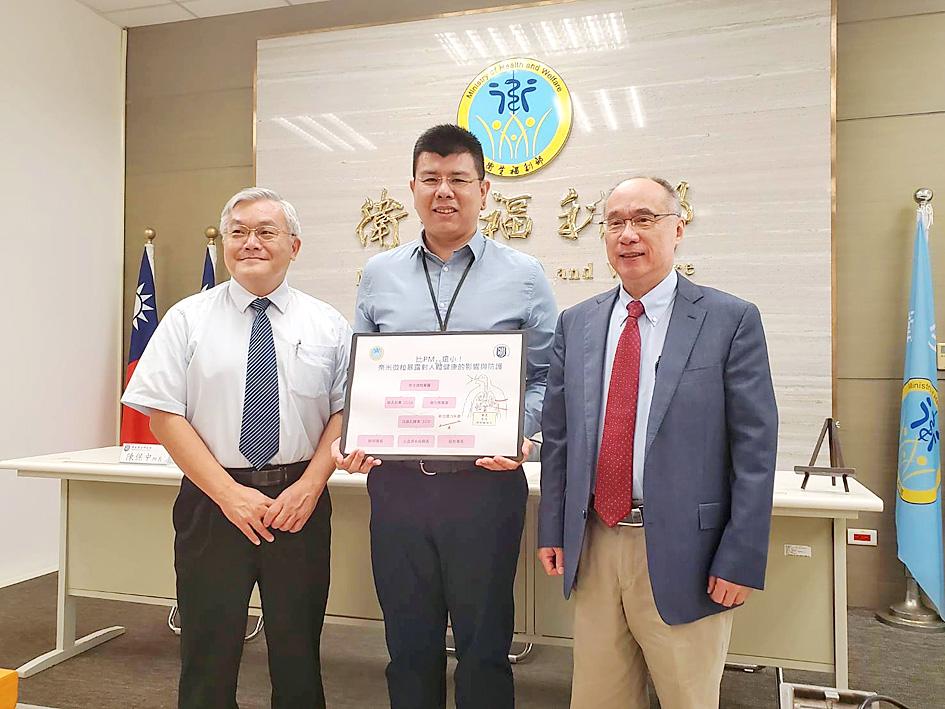A panel study by National Health Research Institutes (NHRI) researchers has found that long-term exposure to nanoparticles can cause oxidative stress, which can lead to cell damage and inflammation.
The research team led by investigator Liou Saou-hsing (劉紹興), who has since passed away, and principal investigator Wu Wei-te (吳威德), of the NHRI’s National Institute of Environmental Health Sciences, conducted a four-year follow-up study to understand the health effects that handling engineered nanomaterials has on workers.
At the Ministry of Health and Welfare in Taipei yesterday, Wu said many people have heard of PM2.5 — particulate matter smaller than 2.5 micrometers — but nanoparticles are much finer, with a diameter of less than 0.1 micrometers, with a wide spectrum of applications.

Photo: Lin Hui-chin, Taipei Times
Nanotechnology applications include electronic materials, health products, textiles, sports equipment, household products, sanitary ware and even food products, he said, adding that the wide use of nanomaterials has led to a rapid increase in the number of workers exposed to engineered nanoparticles.
Studies on mice have shown that the effects of inhaling engineered nanoparticles include pulmonary fibrosis, inflammation, granuloma, cardiovascular issues, oxidative stress, pleural plaque formation and lung cancer, as well as mesothelioma-like effects, but there were no long-term studies of the health effects on workers, Wu said.
The team examined biomarkers in 206 workers who handled nanomaterials and 108 unexposed workers in a control group from 14 nanotechnology plants, and collected blood, urine and exhaled breath condensate specimens five times several months apart throughout the four years, he said.
Pulmonary function, heart rate variability and neurobehavioral tests, as well as self-administered questionnaires, were also repeatedly performed, he added.
The study found that long-term exposure to nanoparticles can cause oxidative stress, which is an imbalance of free radicals and antioxidants in the body, as the antioxidant enzyme superoxide dismutase was significantly elevated in the workers who handled nanomaterials, Wu said.
Oxidative stress can cause chronic inflammation, leading to a higher risk of cardiovascular or lung damage and cell injury, he said.
However, cardiovascular dysfunction, lung damage, inflammation, oxidative damage, and neurobehavioral and genotoxic markers were not found to be directly associated with handling nanomaterials, he said, adding that direct adverse health effects from long-term exposure to nanoparticles were not found through the study.
However, researchers found that many workers were only wearing activated carbon masks when handling nanomaterials, and the team has suggested that they wear N95 respirators to better protect against nanoparticles, Wu added.

Palauan President Surangel Whipps Jr arrived in Taiwan last night to kick off his first visit to the country since beginning his second term earlier this year. After arriving at Taoyuan International Airport at around 6:30 pm, Whipps and his delegation were welcomed by Minister of Foreign Affairs Lin Chia-lung (林佳龍). Speaking to gathered media, the Palauan leader said he was excited and honored to be back in Taiwan on his first state visit to Taiwan since he was sworn in this January. Among those traveling with Whipps is Minister of State Gustav N. Aitaro, Public Infrastructure

President William Lai (賴清德) yesterday thanked Palau for its continued support of Taiwan's international participation, as Taipei was once again excluded from the World Health Assembly (WHA) currently taking place in Switzerland. "Palau has never stopped voicing support for Taiwan" in the UN General Assembly, the WHO and other UN-affiliated agencies, Lai said during a bilateral meeting with visiting Palau President Surangel Whipps Jr. "We have been profoundly touched by these endorsements," Lai said, praising the Pacific island nation's firm support as "courageous." Lai's remarks came as Taiwan was excluded for the ninth consecutive year from the WHA, which is being held in

RESOLUTIONS DEBATE: Taiwan’s allies said that UN and WHA resolutions cited by China and other nations ‘do not determine Taiwan’s participation in WHO activities’ A proposal to invite Taiwan to this year’s World Health Assembly (WHA) was rejected on Monday, resulting in Taipei’s absence from the annual meeting for a ninth consecutive year, although partners spoke up for Taiwan’s participation at the first day of the meeting. The first agenda item after the opening was a “two-on-two debate” on a proposal to invite Taiwan to participate at the WHA as an observer. Similar to previous years, two countries made statements in favor of the proposal, while two others expressed their opposition. Philippine Secretary of Health Teodoro Herbosa, president of the 78th WHA, accepted the WHA General Committee’s

At least three people died and more than a dozen were injured yesterday afternoon when a vehicle struck a group of pedestrians in New Taipei City’s Sansia District (三峽). The incident happened at about 4pm when a car rammed into pedestrians at an intersection near Bei Da Elementary School. Witnesses said the sedan, being driven at a high speed, ran a red light, knocking scooters out of the way and hitting students crossing the road before careening into a median near the intersection of Guocheng and Guoguang streets. The incident resulted in three deaths and 13 injuries, including the driver, a 78-year-old man